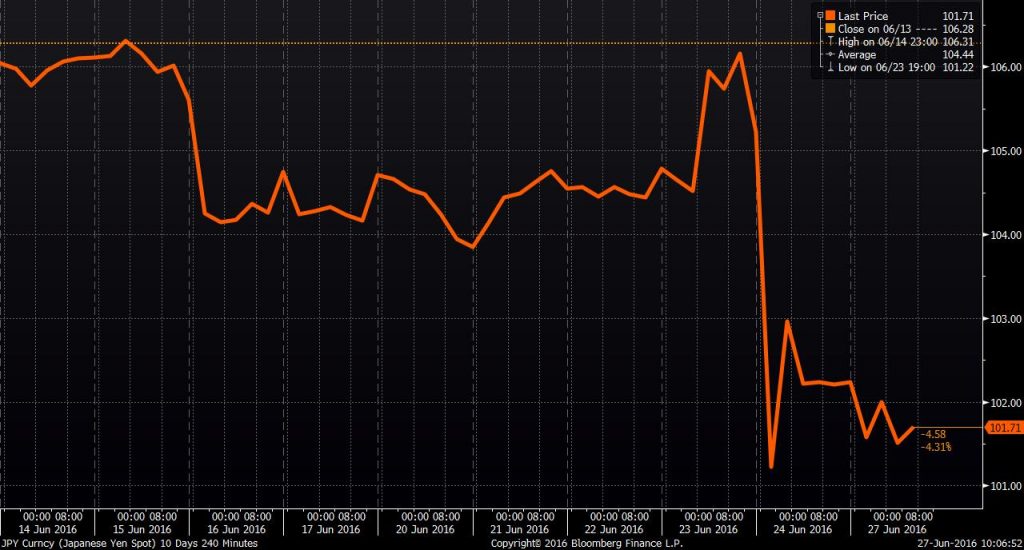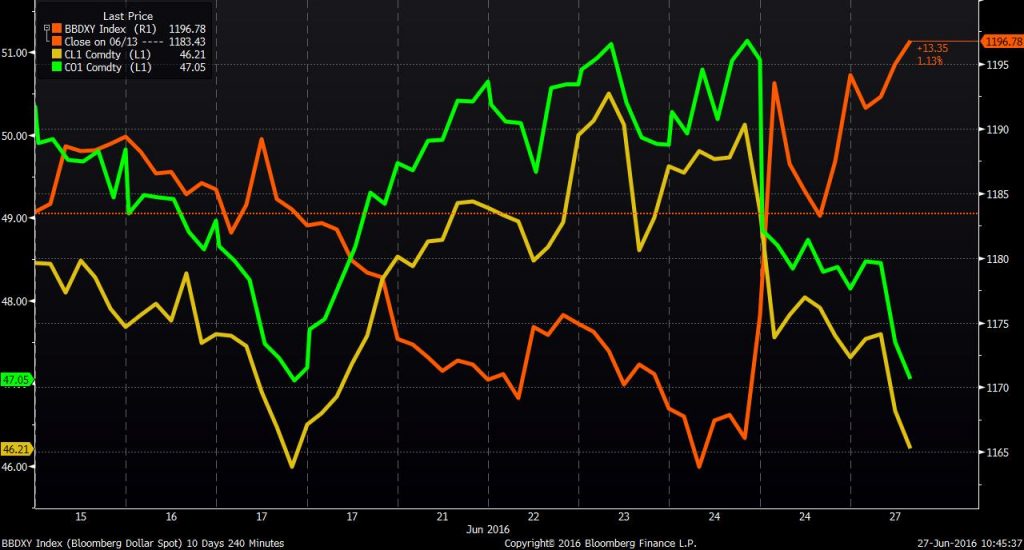Markets see the largest single-day selloff in history following the Brexit, currencies react
The surprise decision by the United Kingdom to leave the European Union triggered the largest single-day selloff in history, according to Standard & Poor’s Dow Jones Indices. The Brexit vote was proceeded by a $2.08 trillion selloff, a sharper decline than even the one that followed the bankruptcy of Lehman Brothers during the 2008 financial crisis, reports BNN.
The Dow Jones industrial average was down 299.99, or 1.7%, at 17,100.76, the S&P 500 42.44 points, or 2.8%, at 1995.21 and the Nasdaq Composite 127.14 points, or 2.7%, at 4582.13, on Monday.
European stocks were down for a second day as well with the pound sterling falling more than 2%. The FTSE was down 156.49 points, or 2.6%, Monday, while the European banks index hit its lowest since July 2012. An index of European bank shares fell 7.3%, taking losses in the last two trading days to around 20%. Royal Bank of Scotland shares fell 24% while Barclays dropped 18%.
The pound fell 3.7% to as weak as $1.32, surpassing its Friday low as yields on 10-year British government debt fell below 1% for the first time.
Investors fleeing to safer currencies
The news that the U.K. would leave the E.U. caused shockwaves in global investment, with many unsure what this event could mean for Europe and the rest of the world. That uncertainty has pushed many investors to flee both the pound and the euro as they look for safer currencies to hold.
Investors looking for more stable currencies to hold have been buying up U.S. dollars and Japanese yen in increasing volume, strengthening both substantially since the Brexit vote.
The Bank of Japan has intentionally tried to maintain a weak yen against other currencies in an effort to bolster corporate profits, which are largely earned abroad. Japanese Prime Minister Shinzo Abe and Bank of Japan Governor Haruhiko Kuroda oversaw policies to decrease the value of the yen against other currencies from late 2012 to mid-2015 to create inflationary pressures, but which failed to bring higher wages and consumption along with them as well.

On Friday, Japanese Finance Minister Taro Aso and BOJ Gov. Kuroda pledged to work together in a joint statement to maintain currency stability. The government and central bank are considering measures including unilateral intervention to counter abrupt gains in the yen, Bloomberg reported, citing unnamed Finance Ministry officials in the Nikkei newspaper who said action is possible even without U.S. approval.
Concerns over the yen could continue to strengthen the dollar
With the Brexit nearly erasing the impact of more than three years of BOJ stimulus on the yen, Japan may take matters into its own hands to get the economy back toward the BOJ’s 2% inflation rate goal, sending even more investors to the dollar.
Because oil is a dollar-denominated commodity, the stronger the currency gets, the more expensive it is for holders of other currencies to purchase. As the pound, euro and yen all continue to experience uncertainty, the U.S. dollar will likely continue to pick up steam, pushing oil prices down further, a process that is already evident following last week’s Brexit vote.

Supply and demand could rebalance in two quarters
While oil prices continue to fall in the wake of the surprise Brexit decision, EIA Administrator Adam Sieminski believes that supply and demand for oil could even out by the end of the year, he said in an interview with Bloomberg.
The EIA believes the market is still oversupplied by about 0.5 MMBOPD, but that we could start to see more substantial draws on inventories in two quarters, Sieminski said.
The Brexit vote is expected to have very little effect on demand, even as currency volatility continues to put downward pressure on oil prices, Goldman Sachs said following the vote.
“If we assume a 2% drop in U.K. GDP in response to the exit vote, which is on the high end of our economists’ estimates, then U.K. oil demand would likely be reduced by 1% or 16 MBOPD, which is a 0.02% hit to global demand. This is extremely small on any measure,” the bank said.
The IEA’s chief Fatih Birol also downplayed Brexit’s effect on global oil demand, saying “Since a big chunk of oil demand is from emerging countries, namely Asia, I don’t see a major impact (of the Brexit) on oil demand.”
The vote to leave the EU last week was a simple referendum of British voters. For the UK to follow through and formally exit the EU will take two years, according to political analysts.







